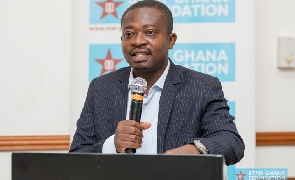Chief Executive Officer-Association of Ghana Industries (AGI) Seth Twum Akwaboah has reiterated the need for long-term national development policies and plans which ensure economic stability.
This, he noted, will strengthen the private sector, which is a major driver of the economy, to thrive. “Our economy has gone through turbulent times, and even today we experience the same issues. Indeed, the private sector comes under severe pressure whenever there is economic instability; and as we all know, the private sector is the key driver for economic growth. Therefore, we have a lot of interest in having long-term planning that ensures stability in our economy so we can plan, invest and do business”.
The association’s president made these remarks at the launch of ‘Vision 2057: Long-Term National Development Perspective Framework’ published by the National Development Planning Commission (NDPC).
Speaking on behalf of AGI and the private sector, Mr. Akwaboah also shared hope for transformation of the industrial sector to be resilient and enabled to compete both locally and internationally, as well as provide decent and sustainable jobs for the people.
At the heart of these plans, he noted, is incorporation of the SDGs into the long-term framework, which he indicated is laudable.
“We therefore remain aligned with a comprehensive vision that provides a good map toward a prosperous, self-reliant and resilient nation, with strong emphasis on economic growth and environmental sustainability.
“We are also happy to note the sustainable development goals have been incorporated into your plans, and therefore gives us assurance that we are not just developing but developing on a sustainable basis,” he stated.
Aside from the SDGs, Mr. Akwaboah also emphasised the need to leverage ICT and AI in implementing the long-term plans to transform the country’s economy as the world undergoes transformation.
“We ought to leverage the fourth industrial revolution. AI, science and innovation, ICT are key enablers and we need to keenly incorporate them.
“In the coming years we should see an economy charting a robust and sustainable growth path that breaks the cycle of seeking IMF bailouts every time we have a challenge, so that we become self-reliant and export-oriented economy.
“We are confident that our shared interest in the socioeconomic transformation and creations of our country will enable us to join efforts in making this vision a reality,” he further added.
Chairman-NDPC, Prof. George Gyan-Baffour, in his opening remarks at the event, noted that the document will guide future generations and governments to choose which programmes and policies to implement.
To achieve the set goals, Pro. Gyan-Baffour stressed the need for collaboration, cooperation and partnership among stakeholders, as well as international partners.
“At the heart of vision 2057 lies our overarching goal to improve the living standards of Ghana by elevating it to an upper-middle income country by 2057,” he added.
Vision 2057: Long-Term National Development Perspective Framework
The framework is a vision document that reflects the development aspirations of Ghana’s people, from which current and future Medium-Term Development Plans will be derived. It specifies how Ghana will look in terms of its social, economic and environmental development by 2057; and identifies the development goals for Ghana’s 100th anniversary; the objectives for realising the goals; and the strategic direction and development path to be pursued in achieving the goals.
It envisions Ghana as a prosperous, self-reliant and resilient nation with a strong emphasis on economic growth, social development and environmental sustainability.
The framework does not provide specific actions, programmes and projects required to achieve the targets, as these are left for current and future generations and governments to determine through new technologies and manifestos. It serves as a guide for sectors and local governments in the preparation of their medium-term development plans which are integrated into the country’s medium-term national development plans. This means that it will allow flexibility for governments to steer the state of affairs toward the universally accepted pursuit of creating a just, free and prosperous nation as enshrined in the 1992 Constitution.
This flexibility is required to ensure continuity in the country’s development path, whereby every political party that comes into power will have flexibility to prepare its own manifesto, its Coordinated Programme of Economic and Social Development Policies (CPESDP) and provide its own methods and approaches in pursuing this universal goal.
The Framework is guided by a number of documents – including the Black Star Rising: Long-Term National Development Plan (2018-2057) commonly known as the 40-year Plan; Ghana@100, National Development Policy Framework (Vision 2020); Africa Union Agenda 2063; and United Nations Sustainable Development Goals (UN SDGs).
In addition, some goals, objectives and suggested strategic directions are influenced by lessons learnt from impacts of global issues from the COVID-19 pandemic, climate change and geopolitical challenges currently confronting mankind.
Click to view details



Business News of Friday, 31 May 2024
Source: thebftonline.com

















